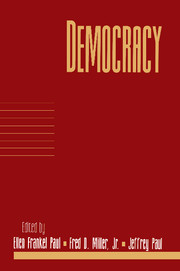Book contents
- Frontmatter
- Contents
- Introduction
- Acknowledgments
- Contributors
- The Very Idea of Popular Sovereignty: “We the People” Reconsidered
- Quasi-Rights: Participatory Citizenship and Negative Liberties in Democratic Athens
- Is There a Duty to Vote?
- Postmodern Liberalism and the Expressive Function of Law
- Democratic Epistemology and Accountability
- Political Quality
- Why Deliberative Democracy Is Different
- The Institutions of Deliberative Democracy
- Democracy as a Telos
- Radical Democracy, Personal Freedom, and the Transformative Potential of Politics
- Democracy and Value Pluralism
- The Problem of Russian Democracy: Can Russia Rise Again?
- Index
Political Quality
Published online by Cambridge University Press: 03 May 2010
- Frontmatter
- Contents
- Introduction
- Acknowledgments
- Contributors
- The Very Idea of Popular Sovereignty: “We the People” Reconsidered
- Quasi-Rights: Participatory Citizenship and Negative Liberties in Democratic Athens
- Is There a Duty to Vote?
- Postmodern Liberalism and the Expressive Function of Law
- Democratic Epistemology and Accountability
- Political Quality
- Why Deliberative Democracy Is Different
- The Institutions of Deliberative Democracy
- Democracy as a Telos
- Radical Democracy, Personal Freedom, and the Transformative Potential of Politics
- Democracy and Value Pluralism
- The Problem of Russian Democracy: Can Russia Rise Again?
- Index
Summary
INTRODUCTION
Political equality is in tension with political quality, and quality has recently been neglected. My thesis is that proper attention to the quality of democratic procedures and their outcomes requires that we accept substantive inequalities of political input in the interest of increasing input overall. Mainly, I hope to refute political egalitarianism, the view that justice or legitimacy requires substantive political equality, specifically equal availability of power or influence over collective choices that have legal force. I hope to show that political egalitarianism exaggerates individual rights in the conduct of political procedures, and neglects the substantive justice of the decisions made through those procedures. Some unequal distributions of influence may better promote just decisions, and without reliance on any invidious comparisons such as the relative wisdom of the wealthy or the educated.
Put in general terms, the goal is to find an acceptable stopping point between merely formal political equality on the one hand, which places no limits on substantive political inequality, and equal availability of political influence on the other, whose distributive constraints are too severe. The principled basis I offer for such a point is a theory of democratic legitimacy that gives a significant role to the epistemic value of democratic procedures–their tendency to produce decisions that are correct by the appropriate independent moral standards. This approach requires more than merely formal equality, since great substantive inequality in political input will be damaging to the procedure's ability to arrive at just decisions.
- Type
- Chapter
- Information
- Democracy , pp. 127 - 160Publisher: Cambridge University PressPrint publication year: 2000
- 4
- Cited by

